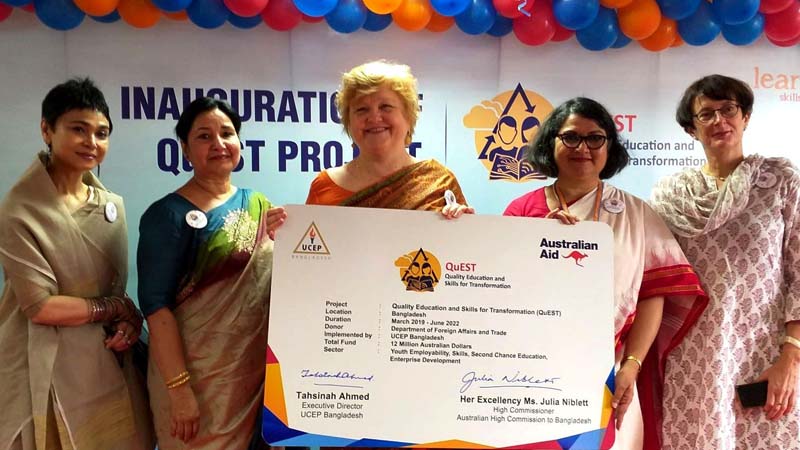Australian aid project launched


Australian High Commissioner to Dhaka Julia Niblett has said that her country wants to ensure that people of Bangladesh are able to contribute to and benefit from Bangladesh’s economic growth.
She said while launching ‘Quality Education and Skills Transformation (QuEST)’, an Australian aid project in partnership with the Underprivileged Children’s Educational Program (UCEP). She was present at the event as the chief guest.
The inaugural ceremony was held at the auditorium UCEP Bangladesh at Mirpur in Dhaka on Sunday. Fahmida Shabnam, team leader of Human Development Team of DFAT, Parveen Mahmud, FCA Chairperson of UCEP Bangladesh, and Tahsinah Ahmed, Executive Director of UCEP Bangladesh were also present at the event.
The project ‘QuEST’ has been developed by UCEP Bangladesh with the financial support of the Department of Foreign Affairs & Trade (DFAT). UCEP Bangladesh was established by Lindsay Allan Cheyne, a New Zelander, in 1972 with the motto `Help to learn, Skills to Earn”. It is a non-governmental organisation which provides second chance education to out of school children and decent work to youth and adults through Technical Vocational Education & Training (TVET) and Skills Development. It has a special focus on social inclusion and therefore gives priority to females, children and youth from poor and underprivileged families.
The QuEST project will provide equitable access to quality education to children and youth, including those from underprivileged families, especially girls, persons with disabilities and minorities. It will also enhance employability of disadvantaged youth through Technical Vocational Education and Training (TVET) and Skills Development.
In her speech, Julia Niblett said, “We are committed to ensuring that no-one is left behind in Bangladesh’s development. It is a regrettable fact that low skill levels in the Bangladesh labour force continue to limit the country’s economic growth potential.”
The High Commissioner said the current labour force is under educated and under skilled. Only half of the workforce is literate and less than 1 percent have received some form of vocational education, she added.
She mentioned that Bangladesh recognises that it needs to improve education and skills development in order to fulfill its objective of achieving middle-income status. It understands that skill development is vitally important for this.
“The Australian government is delighted to be commencing this new partnership with UCEP to work together to tackle these issues,”
she said.
Australia is committed to supporting the government of Bangladesh in increasing access to quality primary education for poor and disadvantaged out-of-school children in urban areas and implementing the market driven Technical Vocational Education and Training system underpinned by the government of Bangladesh’s National Skills Development Policy, said the High Commission.
Through this partnership, DFAT aims to strengthen the work of UCEP to help fulfill Bangladesh’s development objectives.
Australia will invest AUD12 million over three years (March 2019 to June 2022) and this investment will develop a new partnership with UCEP to expand the Australian Aid Program’s focus on addressing skill gaps.
UCEP provides pathways through education into vocational skill training and job placement for poor urban children and adolescents, particularly those who have dropped out of or never enrolled in school.
UCEP courses are recognised by the government of Bangladesh and those respond to the needs of the private sector.
The project will also help UCEP strengthen institutional capacity with a major focus on strengthening systems for disability and gender inclusion, said the High Commission.




